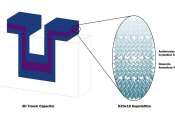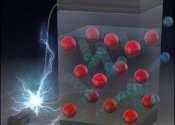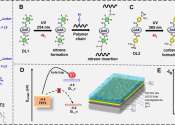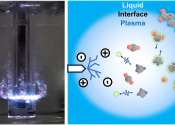Soft e-skin that communicates with the brain
Researchers at Stanford University have developed digital skin that can convert sensations such as heat and pressure to electrical signals that can be read by electrodes implanted in the human brain.
Robotics

Researchers at Stanford University have developed digital skin that can convert sensations such as heat and pressure to electrical signals that can be read by electrodes implanted in the human brain.
Energy & Green Tech

Researchers at MIT say they have created a new material that will pave the way to faster charging batteries.
Engineering

A team of organic chemists and engineers from Linköping University and KTH Royal Institute of Technology, both in Sweden, has demonstrated that working transistors can be made from treated wood. The results have been published ...
Electronics & Semiconductors

Countless hardware and software solutions created over the past decades draw inspiration from animals and natural phenomena. This includes electronic skins (e-skins), flexible and stretchable electronic circuits designed ...
Robotics

Engineers at Princeton and North Carolina State University have combined ancient paper-folding and modern materials science to create a soft robot that bends and twists through mazes with ease.
4 hours ago
0
0
Electronics & Semiconductors

In the ongoing quest to make electronic devices ever smaller and more energy efficient, researchers want to bring energy storage directly onto microchips, reducing the losses incurred when power is transported between various ...
7 hours ago
0
12
Energy & Green Tech

Charge-recharge cycling of lithium-super-rich iron oxide, a cost-effective and high-capacity cathode for new-generation lithium-ion batteries, can be greatly improved by doping with readily available mineral elements.
May 2, 2024
0
43
Engineering

A research team has developed a memory transistor capable of adjusting its threshold voltage. This innovation combines two molecules that form a stable bond with a polymeric semiconductor, situated at the end of a molecular ...
May 2, 2024
0
40
Energy & Green Tech

In a world first, University of Sydney researchers have developed a chemical process using plasma that could create sustainable jet fuel from methane gas emitted from landfills, potentially creating a low-carbon aviation ...
Apr 30, 2024
0
51
Energy & Green Tech

A pair of environmental engineers at the University of California, Davis, has found that in order to meet the needs of the growing number of electric vehicles (EV) in that state in the coming decades, California power producers ...
Electricity (from the New Latin ēlectricus, "amber-like"[a]) is a general term that encompasses a variety of phenomena resulting from the presence and flow of electric charge. These include many easily recognizable phenomena, such as lightning and static electricity, but in addition, less familiar concepts, such as the electromagnetic field and electromagnetic induction.
In general usage, the word 'electricity' is adequate to refer to a number of physical effects. However, in scientific usage, the term is vague, and these related, but distinct, concepts are better identified by more precise terms:
Electrical phenomena have been studied since antiquity, though advances in the science were not made until the seventeenth and eighteenth centuries. Practical applications for electricity however remained few, and it would not be until the late nineteenth century that engineers were able to put it to industrial and residential use. The rapid expansion in electrical technology at this time transformed industry and society. Electricity's extraordinary versatility as a source of energy means it can be put to an almost limitless set of applications which include transport, heating, lighting, communications, and computation. The backbone of modern industrial society is, and for the foreseeable future can be expected to remain, the use of electrical power.
This text uses material from Wikipedia, licensed under CC BY-SA